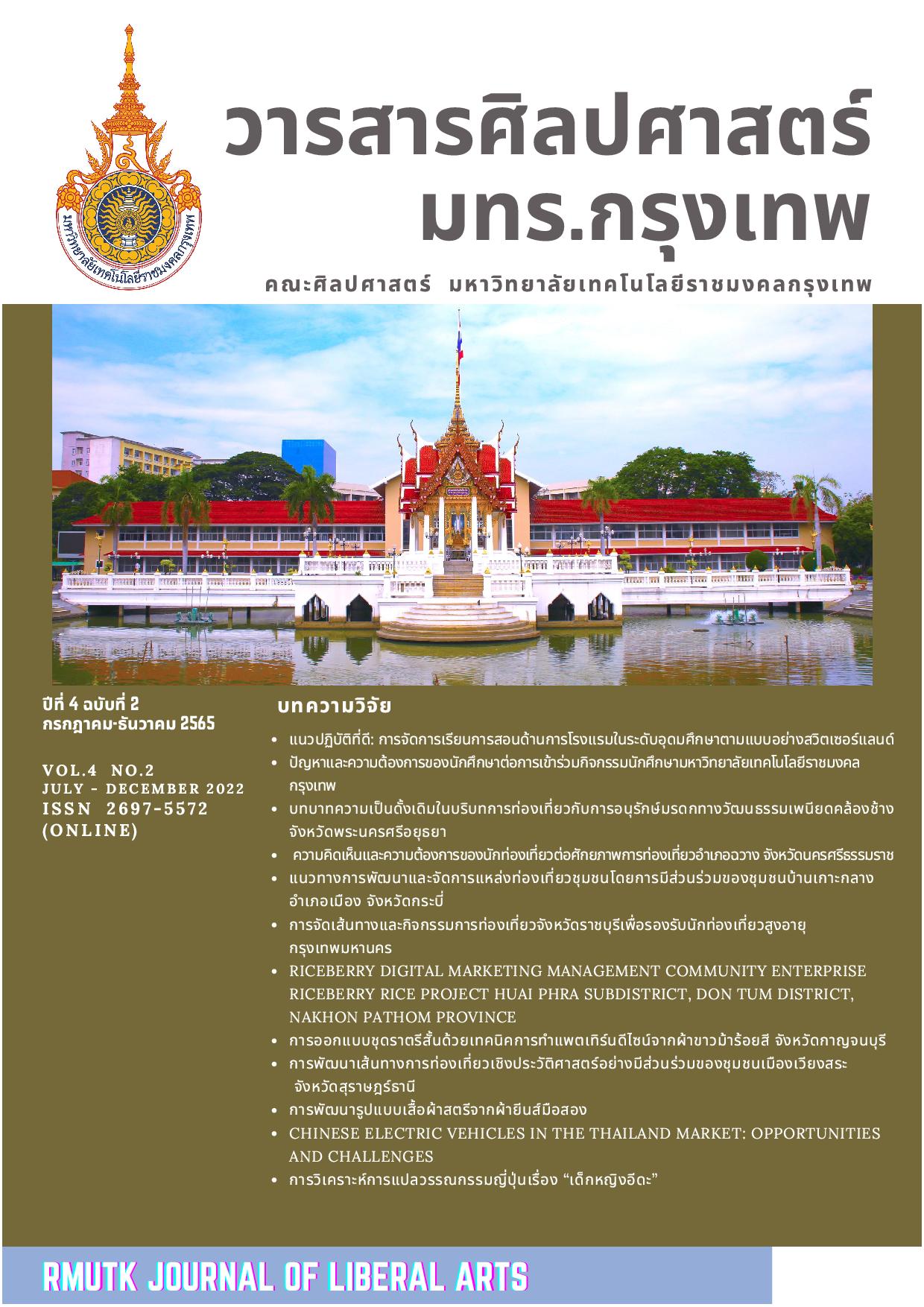GUIDELINES ON THE DEVELOPMENT AND MANAGEMENT OF COMMUNITY TOURIST ATTRACTIONS THROUGH THE PARTICIPATION OF BAN KOH KLANG COMMUNITY, MUANG DISTRICT, KRABI PROVINCE
Main Article Content
Abstract
The objectives of this study were: 1) to study tourist attraction management components at Ban Koh Klang, Muang District, Krabi Province. 2) to assess the level of participation in the Ban Koh Klang community in Muang District, Krabi Province. 3) to study the guidelines for developing and managing community tourist attractions with the participation of Ban Koh Klang Community, Muang District, Krabi Province. This research was quantitative mixed-method research and qualitative research. Used a questionnaire to collect data from a sample of 340 people. The interview was conducted with ten respondents related to the tourism management of the Ban Koh Klang community. The statistics used for analysis were frequency distribution, percentage value, mean, standard deviation, and Pearson correlation. The research results are as follows: It was found that most questionnaire respondents were female, 183 people. They were mostly aged between 20 and 40 years old. From the analysis of the study of tourism attraction management in Ban Koh Klang community, Mueang District, Krabi Province, as follows: 1) improve access to tourist attractions by focusing on transportation, public relations, and essential utilities. 2) Accommodation development for tourists by asking for budget support from the government and private sector to meet the standard of accommodation following Thai homestay standards. 3) tourist attractions to support tourists by studying work in a community tourist attraction that has a similar context to the Ban Koh Klang community, which is a Muslim way of life and cultural tourism 4) The development of tourism activities: There are creative and interesting activities, including making various products 5) all miscellaneous services provided to tourists, and 6) the development of community readiness and understanding by cooperating with the network of educational institutions in the area. The level of participation of the Ban Koh Klang community, Muang district, Krabi province, was at the highest level (=4.65). The community-based tourism attraction management was related to the participation of the Ban Koh Klang community, Muang district, Krabi province. At the .05 level, there are significant guidelines on the development and management of community tourist attractions with community participation, such as the establishment of a tourism community enterprise and visiting community attractions that have a context close to the Ban Koh Klang community, which is a way of life and tourism, Muslim culture. There are interesting activities related to making various products. Moreover, cooperate with the network of educational institutions in the area.
Article Details

This work is licensed under a Creative Commons Attribution-NonCommercial-NoDerivatives 4.0 International License.
References
กลุ่มงานยุทธศาสตร์และข้อมูลเพื่อการพัฒนาจังหวัดกระบี่. (2563). เอกสารข้อมูลด้านอาชีพของประชากรในตำบลคลองประสงค์ อำเภอเมือง จังหวัดกระบี่. กระบี่: ศาลากลางจังหวัดกระบี่.
กองเศรษฐกิจการท่องเที่ยวและกีฬา กระทรวงการท่องเที่ยวและกีฬา. (2559). เอกสารนำเสนอผลการสำรวจทัศนคติและความพึงพอใจของนักท่องเที่ยวชาวต่างชาติที่เดินทางท่องเที่ยวในประเทศไทย. สืบค้นจาก https://secretary.mots.go.th/ewtadmin/ewt/policy/group2.php.
กันยาวรรนธ์ กำเนิดสินธุ์. (2560). การมีส่วนร่วมของประชาชนชุมชนบางน้ำผึ้งในการจัดการแหล่งท่องเที่ยวเชิงอนุรักษ์และวัฒนธรรม. วารสารสารสนเทศ, 16(1), 175-184.
การท่องเที่ยวแห่งประเทศไทย. (2540). การพัฒนาการท่องเที่ยวเรื่องกลยุทธ์การท่องเที่ยวเชิงอนุรักษ์. กรุงเทพฯ: การท่องเที่ยวแห่งประเทศไทย.
คณะกรรมการนโยบายการท่องเที่ยวแห่งชาติ. (2560). เเผนพัฒนาการท่องเที่ยวแห่งชาติ ฉบับที่ 2 (พ.ศ. 2560–2564). สืบค้น http://www.ubu.ac.th/web/files_up/03f2017052216244626.pdf.
เจนจีรา อักษรพิมพ์. (2560). กลยุทธ์การจัดการท่องเที่ยวโดยชุมชนแบบยั่งยืนในจังหวัดนครราชสีมา. วารสารวิจัยและพัฒนา วไลยอลงกรณ์ในพระบรมราชูปถัมภ์, 12(3), 141-154.
ฉลองศรี พิมลสมพงศ์. (2550). การวางแผนและพัฒนาตลาดการท่องเที่ยว. กรุงเทพฯ: สำนักพิมพ์มหาวิทยาลัยเกษตรศาสตร์.
ชิดชนก เชิงเชาว์. (2539). วิธีวิจัยทางการศึกษา (Research Methods in Education). ปัตตานี: มหาวิทยาลัยสงขลานครินทร์.
เชภาดร จันทร์หอม และคณะ. (2560). การท่องเที่ยวโดยชุมชนเพื่อการจัดการฐานทรัพยากรธรรมชาติและสิ่งแวดล้อม. ใน สร้างสุขภาคใต้ ครั้งที่ 10. สถาบันการจัดการระบบสุขภาพ มหาวิทยาลัยสงขลานครินทร์.
ณัฏฐพัชร มณีโรจน์. (2560). การจัดการการท่องเที่ยวโดยชุมชน. วารสารวิชาการการท่องเที่ยวไทยนานาชาติ, 13(2), 25-46.
ธเนศวร์ เจริญเมือง. (2553) ทฤษฎีและแนวคิด: การปกครองท้องถิ่นกับการบริหารจัดการท้องถิ่น (ภาคแรก). กรุงเทพฯ: สำนักพิมพ์คบไฟ.
บุญชม ศรีสะอาด. (2541). การพัฒนาการสอน. กรุงเทพฯ: สุรีวิริยาสาสน์.
บุญพา คำวิเศษณ์. (2557). ข้อมูลพื้นฐานที่ส่งผลต่อการบริหารจัดการแหล่งท่องเที่ยวเชิงนิเวศ แบบมีส่วนร่วม: กรณีศึกษาชุมชนหมู่บ้านวัดเขา ตําบลโคกกลอย อําเภอตะกั่วทุ่ง จังหวัดพังงา. นนทบุรี: วิทยาลัยราชพฤกษ์.
ประสพชัย พสุนนท์. (2558). ความเที่ยงตรงของแบบสอบถามสำหรับงานวิจัยทางสังคมศาสตร์. วารสารสังคมศาสตร์ มหาวิทยาลัยศรีนครินทรวิโรฒ, 18, 375-396.
พจนา สวนศรี. (2546). คู่มือการจัดการท่องเที่ยวโดยชุมชน (พิมพ์ครั้งที่ 1). กรุงเทพฯ: จุฬาลงกรณ์มหาวิทยาลัย.
พวงทอง โยธาใหญ่. (2545). การมีส่วนร่วมของประชาชนในการจัดทำแผนพัฒนาท้องถิ่น กรณีศึกษาองค์การบริหารส่วนตำบลในจังหวัดเชียงใหม่ (การค้นคว้าแบบอิสระ รัฐประศาสนศาสตรมหาบัณฑิต ไม่ได้ตีพิมพ์). มหาวิทยาลัยเชียงใหม่, เชียงใหม่.
สำนักงานพัฒนาการท่องเที่ยว กระทรวงการท่องเที่ยวและกีฬา. (2554). คู่มือการประเมินมาตรฐานคุณภาพแหล่งท่องเที่ยว. กรุงเทพฯ: การท่องเที่ยวแห่งประเทศไทย.
สำนักงานพัฒนาการท่องเที่ยว กระทรวงการท่องเที่ยวและกีฬา. (2559). การพัฒนาการท่องเที่ยวเรื่องการอนุรักษ์วัฒนธรรมและขนบธรรมเนียมประเพณีของชุมชน. กรุงเทพฯ: การท่องเที่ยวแห่งประเทศไทย.
สำนักบริหารการทะเบียน อำเภอเมืองกระบี่. (2563). ประกาศสถิติจำนวนประชากรประจำปี. กระบี่: ส่วนราชการจังหวัดกระบี่
Buhalis, D. (2000). Marketing the competitive destination of the future. Tourism management. 21(1). 97-116.
Cohen, Eric. (1996). Thai Tourism: Hill Tribes, Island and open-ended Prostitution. Bangkok: white Lotus.
Denis E. Poplin. (1979). Communities: A Survey of Theories and Method of Research. New York: Macmillan Publishing Co., Inc.
Ma, X., & Macmillan, R. B. (1999). Influences of Workplace Conditions on Teachers Job Satisfaction. Journal of Educational Research, 93, 39-48.
Textor, R. B. (1980). A Handbook on ethnographic futures research (3rd ed.). Cultural and Educational Futures Research Project, School of Education and Department of Anthropology, Stanford University, Stanford, CA.


